The Australian baby formula frenzy: Is China really bleeding the nation dry?
It’s become the endless cycle that is regularly infuriating Australian families.
Lines of shoppers stripping supermarket shelves bare of baby formula before it is shipped off to China is leaving a bitter taste in the mouths of other consumers.
There seems to be new footage surfacing every week of shoppers rorting the two-tin limits in place at Coles and Woolworths.
But how did it all start? And the burdening question on the lips of millions of Australians: will it ever end?
A surging interest in Australian produced baby formula in China stems from the 2008 baby formula epidemic which saw six babies die and over 400,000 others falling sick with kidney problems, many needing a lifetime of treatment.
There were 20 companies, most prominently the Sanlu Group, that were indicted in the controversy after melamine, a chemical used to make plastic, was added to powdered milk to artificially boost protein levels, as those involved in the industry tried to meet the demand of its growing market.
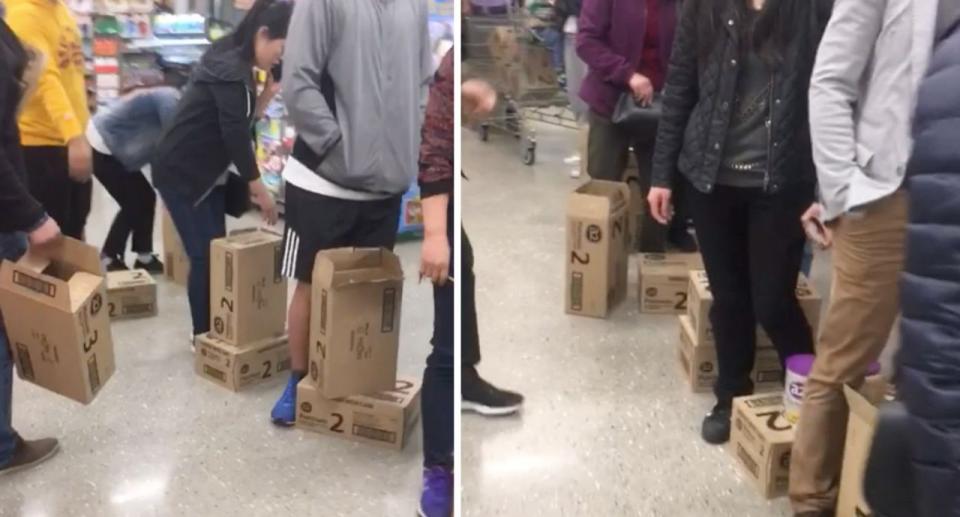
The implications were so severe, dairy farmer Zhang Yujun and salesman Geng Jinping were sentenced to death over their roles in the saga while 19 others were jailed, including the life imprisonment of Sanlu Group’s former chairwoman Tian Wenhua.
The incident rocked China and shattered the public’s confidence in domestic produce.
Young mothers instead went in search of respected products further afield, prompting a surge in sales of baby formula from abroad which has culminated in the chaotic scenes we are accustomed to seeing weekly in our supermarkets.
Insight into parents’ minds in China
British mother-of-two Sophie was one of those concerned parents who turned their backs on Chinese-made formula in the years after the crisis.
“None of my friends bought Chinese milk powder and when I asked them why, they said a few years ago there was a lot of fake stuff going around” she told Yahoo News Australia.
“No one trusted the Chinese stuff anymore so everyone buys abroad.”
Sophie has lived in China’s south since 2012, settling in the country after marrying a Chinese national several years later. Her Chinese-born daughters were both brought up using imported baby formula.
“I just followed [my friends] basically. Everyone gets friends in Europe or Australia to ship it over,” she said, pointing to what we now commonly refer to as ‘daigous’.
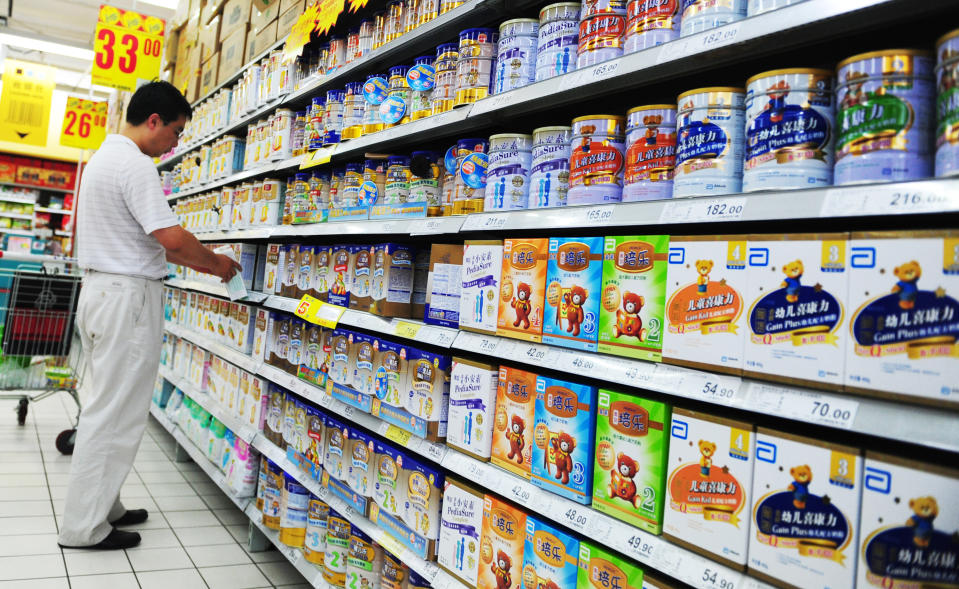
The industry of the daigou, which translates as surrogate shopper, has grown to a multi-billion dollar one and sees Australian-living Chinese or tourists take orders from their native country before sending formula back home.
Under Australian Government dairy product export rules to China, formula can be sent if the consignment is under 10kg. Multiple consignments can be sent if the recipient differs.
Daigou shoppers can reportedly make more than $100,000 a year from their online formula trade.
Those sorts of figures were evidently far too good for even the Chinese Navy to pass up on, with soldiers pictured loading their warship with endless boxes of formula during a recent trip to Sydney.
Australians can find some comfort in the fact we’re not alone. Huge spikes in sales have been seen across the world in nations where dairy products are highly respected – namely New Zealand, the UK and Germany.
Baby formula sales boosting Australian economy
However Stuart Orr, a business professor at Deakin University in Melbourne whose latest publication focuses on Australian companies internationalising to China, told Yahoo News Australia he estimates our nation is responsible for more than half of the international daigou market, which sits annually at about $8 billion.
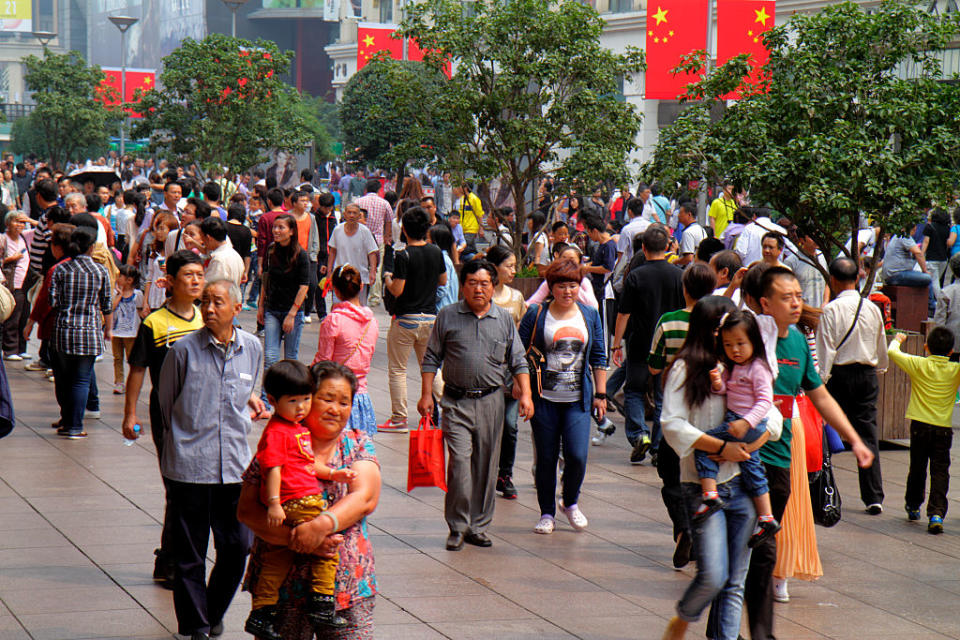
“There’s over half a million middle class Chinese with western levels of buying power and its projected to hit around a billion by 2030, so that’s a very big market,” he said.
And despite multiple countries feeding the beast, there are still chaotic scenes at Coles and Woolworths across the country as customers jostle to get their hands on formula.
Professor Orr said he wasn’t aware of Australians significantly missing out on the product as a result and that such chaotic scenes in supermarkets should actually be appreciated.
“I think it’s generally a positive [scenario]. It’s actually having a genuine positive effect on the economic performance of Australia,” he said.
“We’ve been enjoying the benefits this demand for Australian products for a little while now and it has made a contribution to living standards in Australia.”
Not only that, but as the demand grows, so does the growth of individual companies who are able to produce enough formula to accomodate not only overseas customers but also the Australian market.
“These companies have been able to scale up because of the increased demand. These companies are starting to produce world scale output volumes,” Professor Orr said.
Chinese children ‘stay on formula until age 6 or 7’
The constant demand shows no signs of slowing down thanks to a number of factors.
China is the most populated nation in the world with nearly 1.4 billion people and with the abolition of the one child policy at the beginning of 2016, there has been an emphasis placed on balancing out an ageing population.
With millions of new mothers each year in China, close to 20 million babies born annually, only 21 per cent of those breastfeed their babies exclusively for the first six months, according to UNICEF – the lowest percentage in Asia.
On top of this, mothers in China generally feed their children formula for years after Western mothers typically move to other forms of milk, Sophie points out.
“People always ask me which brand my five-year-old has,” she said.
“[My youngest daughter] switched to cow’s milk at one, which most UK people do. Chinese [children] stay on the formula until six or seven.”
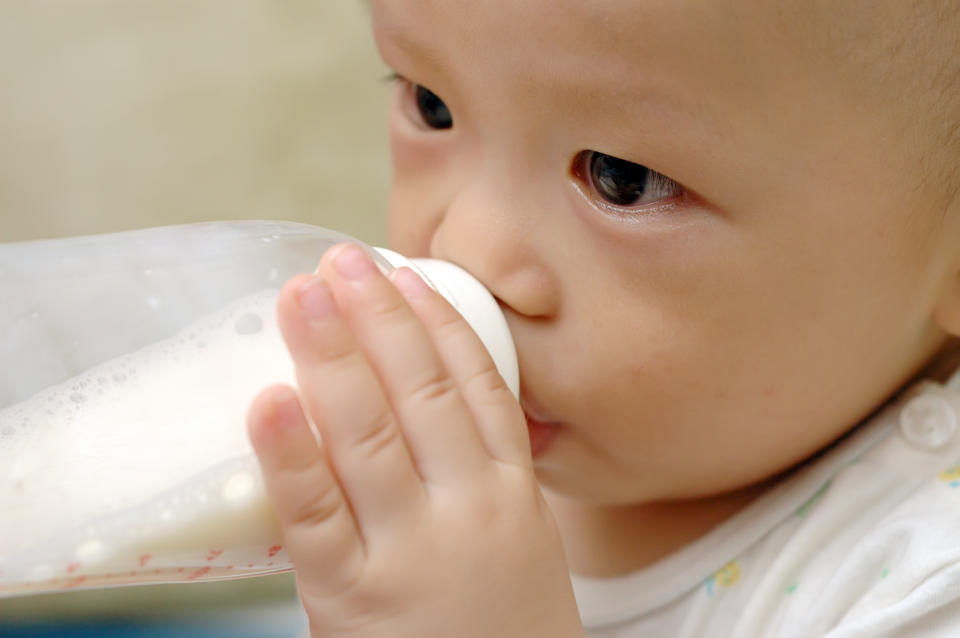
It’s no secret the Chinese economy has grown rapidly over the last decade or so, and with it comes a rise in wealthier citizens wanting to spend their money.
In China, buying Western brands is a sign of wealth and status, for example purchasing an imported car such as a Mercedes or Audi, which are heavily taxed, is an attractive idea for most affluent individuals.
“There’s a fair bit of exploration as for the bulk of this middle class, it’s newfound purchasing power and they’re exercising it,” Professor Orr told Yahoo News Australia.
Baby formula is no different, with parents buying foreign baby formula “a bit of status symbol”, according to Sophie.
This plays a part in the exorbitant prices of foreign formula that makes it to the shelves in China, up to three times the price of what a daigou can get it for, Sophie says.
Sustained Chinese demand for Australian dairy products
According to Euromonitor International, China’s baby formula market will rocket 21 per cent to roughly $32 billion (A$47 billion) in 2023.
And of course, despite the best efforts to regain the trust of the Chinese population, the industry is still deeply affected by the 2008 scandal.
“I don’t think Chinese baby formula will get [their reputation] back for this generation,” Sophie admitted.
Despite over 10 years on from the epidemic and Chinese-produced baby formula boasting some of its highest quality formula in history, the Chinese public aren’t convinced, for now.
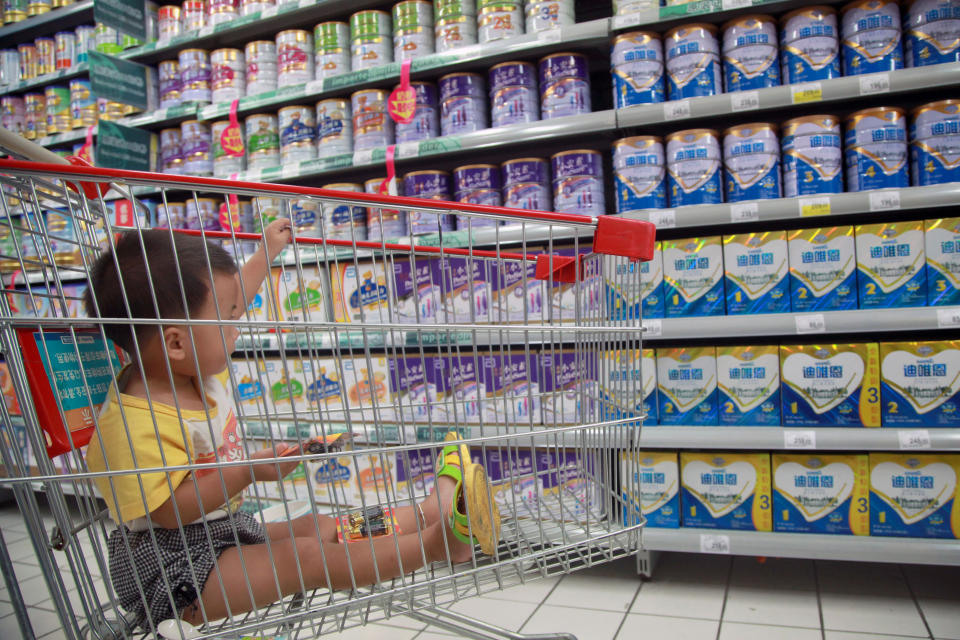
According to Professor Orr, the levels of trust in Chinese formula are a long way off to bring a shift in the market.
“For the future Chinese middle class to move over to purchase from Chinese suppliers, and they would do as they’re a fairly mercantile and nationalistic culture, they would need to have a much higher level of trustworthiness,” he said.
He estimated it could take over 20 years for Chinese formula to emerge from the shadows of foreign brands.
With the trust in foreign milk so strong, Chinese companies have even began sourcing their milk from cows abroad from the US to New Zealand.
“In the short term, seeking overseas milk sources is the most effective way for Chinese milk powder brands to win back consumer confidence,” Luo Yixin, a consumer analyst at Hua Tai Securities, told Bloomberg earlier this year.
That is of course in addition to the other tactics some companies have employed.
“My friend told me that they got a free cinema ticket this weekend with their Chinese milk powder,” Sophie told Yahoo News Australia.
“They’re trying”.
Businesses capitalising on daigou trade
Many seem confused as to why there aren’t more Australian companies importing their product directly to China to eradicate the daigou and ensure a constant and guaranteed supply of formula is available for Australian mothers.
Yet it isn’t quite as simple as that and as Professor Orr points out, the Australian market is somewhat reliant on daigou shoppers.
He says the daigou market has been “bit of a saviour” for Australian baby formula producers as competition grows, and daigous have helped market their products directly to the consumer in China, building a brand trust in the process.
Professor Orr noted that Tasmanian infant formula company Bellamy’s had tried to undercut the daigou and had failed in the process.
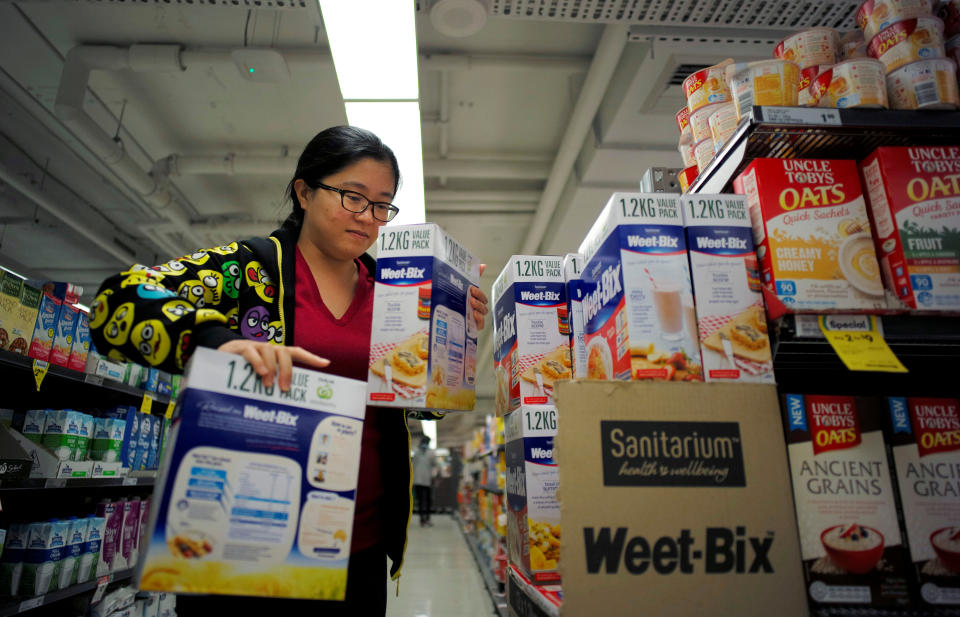
He says the idea of getting produce “straight from the producers” resonates strongly across China.
“You know when you buy eggs straight from the farm, [you think] ‘well I got it straight from the farmer who got it straight from the hens so Im feeling pretty good about that’,” Professor Orr explained to Yahoo News Australia.
“Even in Australia we have a little bit of a cache associated with buying straight from the producer.
“So this is an escalated version of that where a contact or a representative, who is someone the individual trusts and has essentially acquired this straight from the source, delivers it to them in a reliable way through the post.”
Professor Orr said this provides a “high degree of confidence” for Chinese consumers.
Australian companies also have to go through “a lot of red tape” and “hard work” to have their product approved for sale in China.
And with the Chinese government implementing news restrictive rules in 2018 on the import of foreign formula in part to allow its own industry to get back on its feet, many companies aren’t desperate to enter the market.
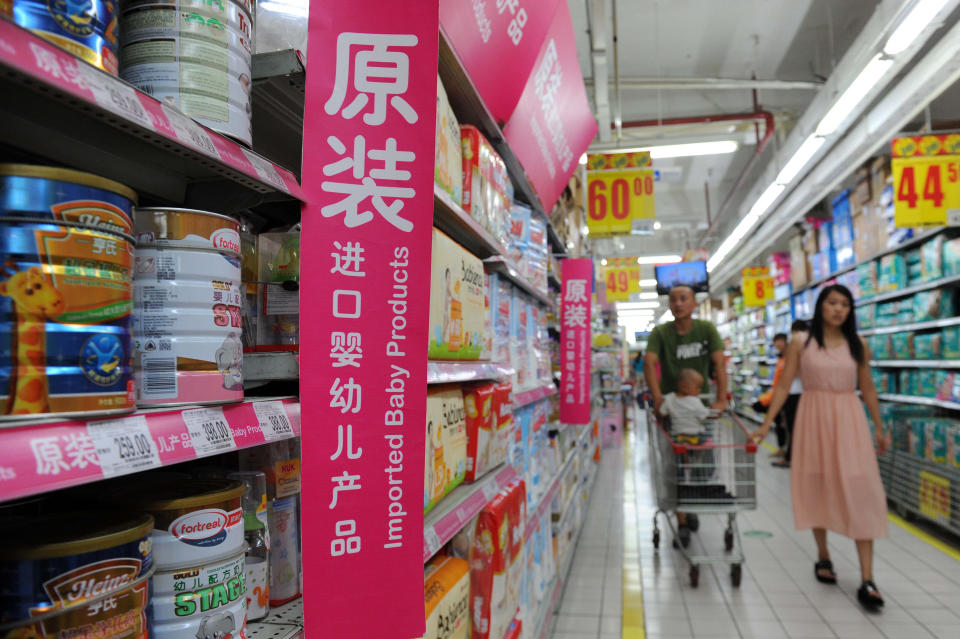
Companies selling direct to Chinese market
Baby formula brand Nature One Dairy is one of only a handful of Australian companies to successfully build a strong presence in the Chinese market.
Nick Dimopoulos, the company’s CEO, told Yahoo News Australia one of the elements that deters Australian brands from trying to break into the Chinese market is the sheer scale of the project at hand.
“Getting into China is not easy. You’ve got to develop channels that will take that product and distribute that product into the market place. It requires a lot of hard and dedicated work,” he said.
“By developing a product and just leaving it there it won’t really get a load of momentum. You’ve literally got to put in the effort and time to build those relationships in China that will push that product to the consumer.”
Mr Dimopoulos said the new regulations have meant factories importing baby formula into China can now do so for only three brands, meaning factories are handpicking brands they believe will be best suited.
For Nature One Dairy, they own their own factory and therefore have a guaranteed path into the the market.
And while the same regulations have been implemented also in China, Chinese companies aren’t faced with the “red tape” foreign brands face and are therefore able to get a step ahead of their overseas competitors.
He said before the restrictions, up to 60 were being sent from a factory. This has reduced the amount of foreign brands in China from about 5000 to “a few hundred”.
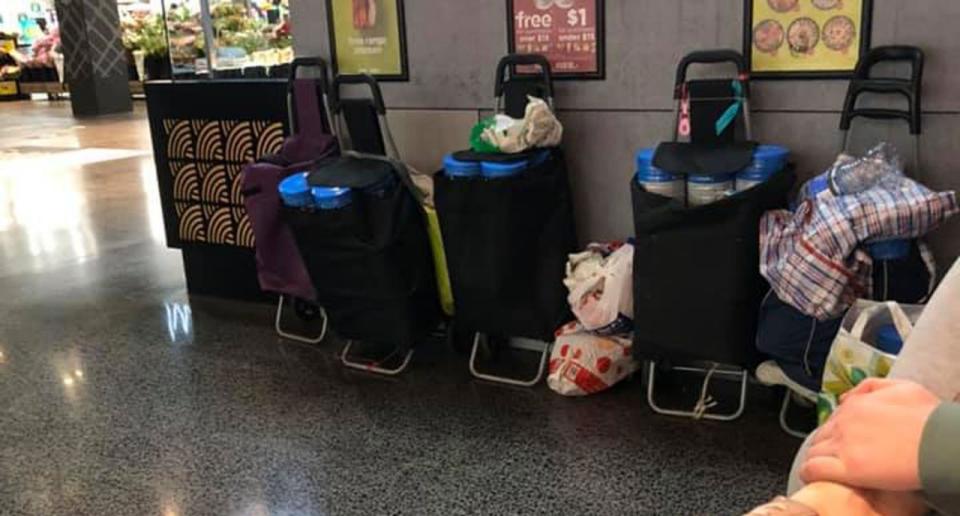
Mr Dimopoulos said the fact that the Australian dairy product is “highly regarded”, alongside a large price differential, the role of the daigou will continue for a long time in the country.
“We read an article at least once a week about Chinese shoppers buying cans off of Coles shelves. What that is is the price gap between what is sold in Australia compared to what’s sold in China. Let’s say a can of formula that sells for $15 to $18 might sell for $50 to $60 there at retail price.”
He noted his company also is a beneficiary of the daigou market and plays an important role in his company’s growth.
Mr Dimopoulos said Nature One Dairy’s Organic formula sells for $26 in Australia but can reach $90 on shelves in China – an attractive opportunity for many daigous.
He said he struggles to see the Chinese produce reasserting itself in the Chinese baby formula market due to the sheer size of the country and a high frequency of scandals surrounding production, not necessarily of baby formula.
“They’re trying desperately. Probably part of these new measures is really to assist their dairy industry to try and grab a hold,” he said.
But he said the reputation of Australian produce simply gives it an edge.
“Its almost like somebody says I bought my coffee at Aldi and another bloke says well I bought it at one of the specialist stores.”
According to Mr Dimopoulos and Professor Orr, the daigou is more important to the Australian producers than ever.
Mr Dimopoulos noted nearly 80 per cent of baby formula sales in retail in Australia are going overseas.
Daigou stores popping up across Australia
One business that is booming from the diagou trade is AuMake, who now have over a dozen locations across Sydney and source highly-coveted products for their stores to provide a simple one-stop shop for daigous.
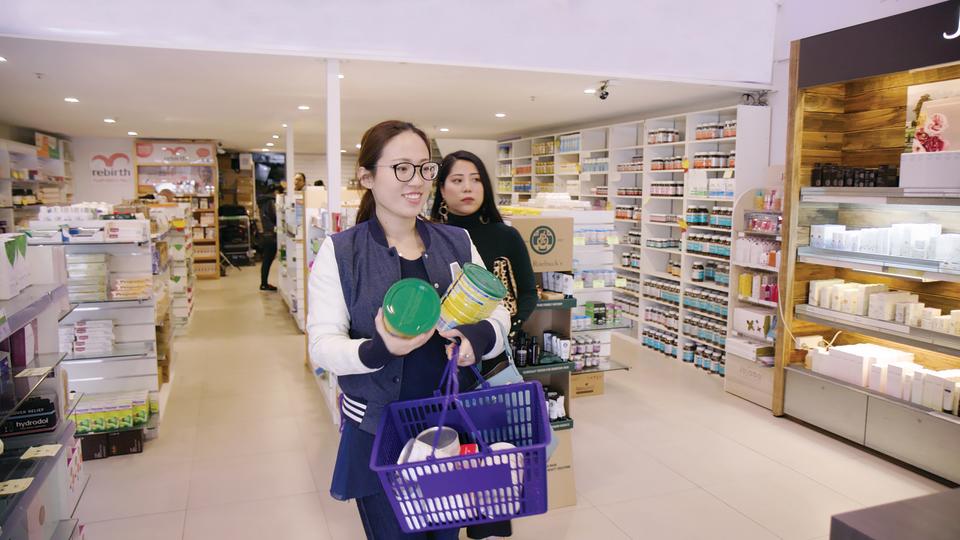
Professor Orr says there is now about 1000 of these types of stores across Australia making it even easier for daigous.
Even Australia Post has jumped onboard the bandwagon opening a daigou postal service in Sydney’s Chatswood.
AuMake’s chairman Keong Chan predicts the growth shows no signs of slowing down.
“We’ve got decades in this cycle and we’re right at the start,” he told Bloomberg earlier this year.
When approached by Yahoo News Australia, Mr Chan declined to comment on how the business’s progression will impact the Australian consumer.
Do you have a story tip? Email: newsroomau@yahoonews.com.
You can also follow us on Facebook, download the Yahoo News app from iTunes orGoogle Play and stay up to date with the latest news with Yahoo’s daily newsletter. Sign up here.



